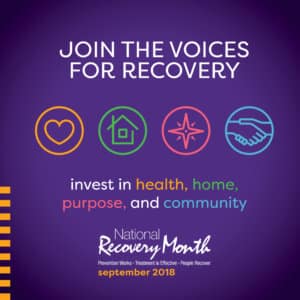 Now in its 29th year, National Recovery Month celebrates the success of those in recovery and helps to raise awareness and understanding of mental health and substance use disorders. This year’s theme, “Join the Voices for Recovery: Invest in Health, Home, Purpose, and Community,” explores how integrated care, an active community, a sense of purpose, and leadership contributes to effective treatments that sustain the recovery of those who have a mental illness or substance use disorder. Every day mental illness and substance use disorders affect millions of Americans and their loved ones.
Now in its 29th year, National Recovery Month celebrates the success of those in recovery and helps to raise awareness and understanding of mental health and substance use disorders. This year’s theme, “Join the Voices for Recovery: Invest in Health, Home, Purpose, and Community,” explores how integrated care, an active community, a sense of purpose, and leadership contributes to effective treatments that sustain the recovery of those who have a mental illness or substance use disorder. Every day mental illness and substance use disorders affect millions of Americans and their loved ones.
- 1 million people had a substance use disorder (2016)
- 7 million adults had a mental illness (2016)
- 2 million adults reported having co-occurring disorders (2016)
With so many living with these conditions, the time is now to work together with individuals, families, providers, and organizations to ensure prevention, treatment, and recovery programs are well established, promoted, and available for all individuals.
How can we show that prevention works, treatment is effective, and people can and do recover?
Healthcare Providers
Healthcare providers have an opportunity to incorporate prevention, treatment, and recovery services into their practice. Research shows there is not enough action being taken to address the increased need for treating behavioral health conditions and promoting recovery in the community.
- In 2016, only about 10% of individuals needing substance use disorder treatment at a specialty facility received it, and over 50% of adults with a mental illness did not receive the mental health services they needed.
- Individuals suffering from behavioral health conditions have up to a seven times greater chance of facing barriers to medical care than those not experiencing these conditions.
Healthcare providers have the power to change how those struggling with mental health conditions or substance use disorders are supported in the community.
- Integrate behavioral health resources and information into your practice
- Educate colleagues, peers, and patients to help reduce stigma and build awareness
- Promote public awareness of the effectiveness of substance use disorder treatment
- Tailor care to address the specific mental health needs of diverse communities
- Know about treatment resources in your community
- Provide appropriate preventive services such as screening and referral to counseling interventions
Communities
Many urban communities have a diverse population that needs broad availability and multiple types of recovery support services. They often face challenges in providing prevention, treatment, and recovery resources, however; research shows the need has never been greater.
- Approximately 29.1 million individuals living in large metropolitan counties and 5.5 million people in nonmetropolitan counties used illicit drugs in 2016.
- Many racial and ethnic minority communities experience a higher rate of behavioral health issues often due to health disparities and poorer access to care; inappropriate care; and higher social, environmental, and economic risk factors.
- Research shows that persons living below the poverty level were nearly 2½ times more likely to have depression than those at or above the poverty level.
- In 2016, an estimated 11.8 million people misused opioids in the past year.
Areas with higher populations often have more treatment and recovery support, but they are often disconnected. Working together to engage and serve the urban communities can help to overcome the barriers to seeking help and providing access to treatment.
- Collaborate on how to address serving the needs of urban-area residents.
- Communicate about recovery successes, new data, or events that impact the community.
- Promote and engage service providers, specialists, and community organizations to take an active role in recovery support to expand community resources.
- Connect individuals in recovery, including their families and partners, with other providers or supports in the area
Policymakers
Today many are feeling the effects of the opioid epidemic and substance abuse, with an estimated 11.8 million people misusing opioids in the past year, and over 20 million diagnosed with a substance use disorder in 2016. Working together local, state, and federal policymakers can be instrumental in addressing the need for prevention, treatment, and recovery support.
- Advocating for insurers to provide equitable coverage for behavioral health conditions including substance use disorders.
- Help safeguard coverage for behavioral health conditions by insurers, so that it is at parity with other medical conditions, as required by law.
- Identify those in the community that are at a more increased risk for certain disorders and ensure they have the tools they need to seek treatment.
- Foster the creation of safe spaces and housing for those experiencing mental and substance use disorders.
- Engage in the national conversation surrounding these issues in their communities.
Untreated mental and substance use disorders not only have devastating personal consequences to individuals and families, but they create financial, economic, and social hardships at all levels in the community. At Lifeskills South Florida, our goal is to work with our clinical partners, communities, and policymakers to raise awareness and understanding of mental health and substance use disorders. We support National Recovery Month and know that the investments we are making in prevention, treatment, and recovery support help those suffering and their families to take the next step towards a new beginning.
Do you need help?
If you or someone you love needs help with a mental health or substance use disorder, Lifeskills is here to help. Our holistic approach to treatment incorporates elements of mindfulness, meditation, and integrated primary care. We go above and beyond to empower individuals during their recovery. Call us today at 954-953-1742 or complete our contact form for more information.




